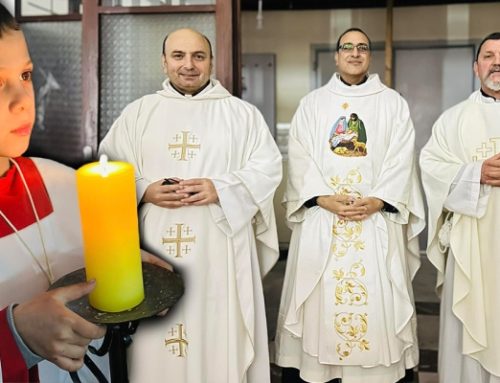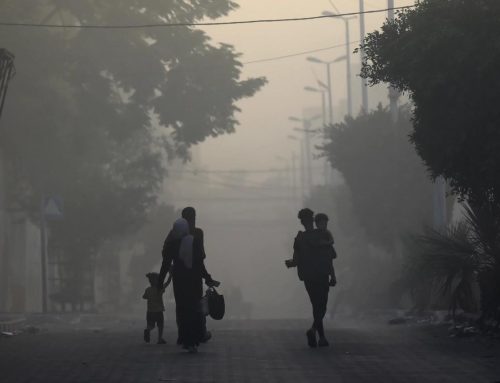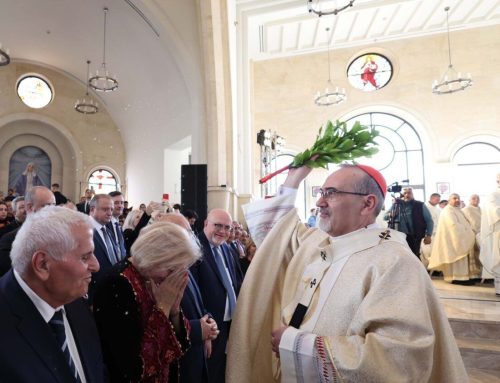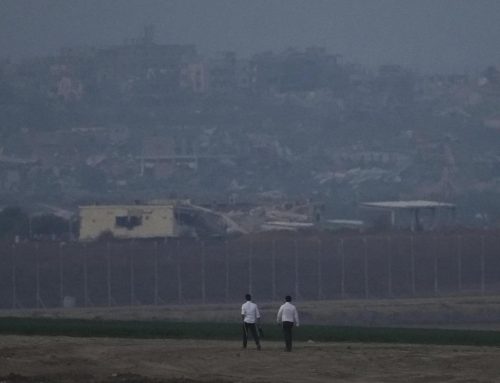We are grateful that you have given us this opportunity to meet with you and are mindful of the additional heads of U.S. churches who joined us in signing this letter. We come with thanks for the wise and strong leadership you are giving to our government’s State Department. We come with support for your effort to end the Israeli-Palestinian cycle of violence and rebuild the trust and mutual confidence that are critical for a negotiated settlement.
June 7, 2001
The Honorable Colin Powell
Secretary of State
United States Department of State
Dear Mr. Secretary:
We are grateful that you have given us this opportunity to meet with you and are mindful of the additional heads of U.S. churches who joined us in signing this letter. We come with thanks for the wise and strong leadership you are giving to our government’s State Department. We come with support for your effort to end the Israeli-Palestinian cycle of violence and rebuild the trust and mutual confidence that are critical for a negotiated settlement.
There is no higher priority for peacemaking in the world today than that between Israel and the Palestinians. This long and tragic conflict is a cancer that threatens the health of the whole region, U.S. relations with Arab and Muslim countries, and interfaith relations worldwide. We, particularly those of us who have precious partnerships with our sister churches in the Holy Land, offer our prayers and encouragement to our government in this crucial work.
Along with many others, we are deeply concerned that the peace process has broken down so violently and tragically between the government of Israel and the Palestinian leadership. The sobering current reality compels us to take a higher profile in advocacy of U.S. policies conducive to peace.
Few things have done more to destroy the hope and pursuit of peace through negotiations than Israel’s unrelenting settlement activity. Over these recent years, we have heard from our Palestinian Christian partners, and seen for ourselves, the destructive impact of Israel’s settlement policy — separating village from village, confiscating more and more Palestinian land, creating friction with its military checkpoints. For over twenty years our churches have appealed to the U.S. government to require Israel to cease this transfer of its civilian population into occupied territory, a clear violation of international law and United Nations resolutions. Each administration has spoken in opposition to the settlement activity, only to watch the settlements increase and expand as Israel ignores the advice.
It is time for the United States to do what it must to bring Israel’s settlement activity to an end. We urge you to make clear to Israel and the Palestinians that the United States is committed to a negotiated end of Israel’s military occupation of the Gaza Strip, the West Bank and East Jerusalem as called for in U.N.S.C. Res. 242 and that an immediate freezing by Israel of its settlement activity including “natural growth” is imperative. It will likely require considerable diplomatic pressure, and possibly economic pressure as well, to convince the government of Israel to recognize that this is a major policy concern of the United States.
Breaking the cycle of violence is fundamental to restarting the peace process and rebuilding the hope and will for peace. While we condemn the violent words and actions of Palestinians, we understand the rage that comes from decades of occupation, dislocation and the feeling of having been betrayed by the peace process. We appeal to the Palestinians, as have you, to abandon violence as a means to end the occupation.
We understand as well Israel’s quest for security for the state and its people, but condemn the disproportionately violent and destructive means it is using. Israel’s practice of assassination and the economic strangulation of the fledgling Palestinian state are counterproductive to either security or peace. We hope that Israel is responsive to your appeal that it lift the siege of Palestinian towns and pay the taxes owed to the Palestinian Authority. We call upon Israel to abandon military force and return to negotiations as the path to security.
A delegation of church leaders on a December pastoral visit saw the destruction wrought by Israel’s military might on the homes and livelihood of the Christian towns of Bethlehem, Beit Jala and Beit Sahour. The delegation urged that the United States suspend the current sales of attack helicopters to Israel pending investigation of their use against civilian targets as well as assurances that they will be used in conformity with United States law covering “end-use” in our weapons sales. We ask you to place a hold on any pending delivery of attack helicopters or fighter jets to Israel and to reconsider the promise made by the Clinton Administration that the United States will increase military aid to Israel for each of the next eight years. While we recognize that it has been U.S. policy to support Israel militarily in order to insure its security and to encourage it to move forward with confidence in negotiations, the use of F-16 fighter jets against civilian populations is unacceptable and must be challenged by the U.S. government. Like the U.S. effort to stop settlement activity, stopping the use of these heavy weapons against civilians will require considerable diplomatic pressure and possibly economic pressure.
Although our concern extends to each person suffering from this conflict, we are extremely worried about our Palestinian Christian brothers and sisters. Facing daily threats from violence and economic deprivation and lacking hope for peace and a viable Palestinian state, many feel the pressure to emigrate. The demise of the living Christian community from the birthplace of the Christian religion would certainly be an irreparable tragedy for the Middle East and the Christian community internationally. For their sake, and for the sake of all, we seek a restoration of hope for a negotiated sharing of the Holy Land and the city of Jerusalem, holy to Jews, Christians and Muslims. We tremble to consider the destructive consequences that would follow the premature moving, as called for by Congress, of the U.S. embassy from Tel Aviv to Jerusalem.
We have heard the cries of fear and mourning of Palestinian Christians and Muslims and of Israeli Jews and pray for their healing and the reconciliation of the Abrahamic family. Be assured of our prayers for you and the President and all others in the Administration as you seek to forge a fair and just policy for the two peoples and three faiths who share a common religious heritage in the land we hold as holy.
Sincerely Yours,
The Most Rev. Frank T. Griswold
Presiding Bishop and Primate
The Episcopal Church
Bishop Vicken Aykazian
Diocesan Legate and Ecumenical Officer
The Armenian Orthodox Church
The Very Rev. Brother Stephen Michael Glodek, S.M.
President
Catholic Conference of Major Superiors of Mens’ Institutes
The Rev. John L. McCullough
Executive Director
Church World Service
Bishop Donald J. McCoid
Southwestern Pennsylvania Synod
Chair, Conference of Bishops of the Evangelical Lutheran Church in America
Bishop Dimitrios of Xanthos
Ecumenical Officer
The Rev. Alexander Karloutsos
Greek Orthodox Archdiocese of America
Bishop William B. Oden
Immediate Past President
The Council of Bishops
The United Methodist Church
The following heads of churches and faith-based organizations join the
delegation in this expression of concern and appeal to Secretary of State
Colin Powell:
Bishop McKinley Young
Presiding Bishop, 10th Episcopal District
African Methodist Episcopal Church
The Rev. Dr. Robert H. Roberts
Interim General Secretary
American Baptist Churches USA
Mary Ellen McNish
General Secretary
American Friends Service Committee
Metropolitan PHILIP, Primate
Antiochian Orthodox Christian
Archdiocese of North America
The Rev. Dr. Richard L. Hamm
General Minister and President
Christian Church (Disciples of Christ) in the United States and Canada
The Rev. Judy Mills Reimer
Executive Director
Church of the Brethren General Board
The Rev. H. George Anderson
Presiding Bishop
The Evangelical Lutheran Church in America
Michael E. Livingston
Executive Director
International Council of Community Churches
The Rev. Dr. Seung Koo Choi
General Secretary of Korean Presbyterian Church in America
Dr. Ron J. R. Mathies
Executive Director
Mennonite Central Committee
The Rev. R. Burke Johnson
President
Moravian Church – Northern Province
The Rev. Dr. Bob Edgar
General Secretary
National Council of the Churches of Christ in the USA
The Rev. Clifton Kirkpatrick
Stated Clerk
Presbyterian Church (USA)
The Rev. Wesley Granberg-Michaelson
General Secretary
Reformed Church in America
Archbishop Cyril Aphrem Karim
Archdiocese of the Syrian Orthodox Church of Antioch for the Eastern USA
The Rev. John Buehrens
President
Unitarian Universalist Association
The Rev. John H. Thomas
General Minister and President
United Church of Christ
Bishop Melvin G. Talbert
Ecumenical Officer
Council of Bishops
The United Methodist Church





